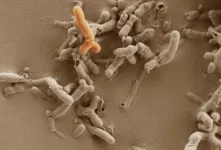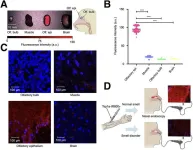(Press-News.org) Even light smoking of just 1-2 cigarettes a day either before or at any time during pregnancy is significantly associated with major health problems in the newborn, finds research published online in the Journal of Epidemiology & Community Health.
The findings add to the evidence indicating that women hoping to become, or who are, pregnant should stub out smoking to protect their newborn’s health, say the researchers.
Deaths and serious health issues among newborns have fallen sharply, largely due to improvements in maternity care. But admission to a neonatal intensive care unit is not uncommon, added to which any neurodevelopmental deficits may persist into adulthood, say the researchers.
In the USA, around 1 in 10 pregnant women smokes, and it’s well known that smoking during pregnancy is associated with heightened risks of preterm delivery, low birth weight, and restricted growth while in the womb.
But less well known, is whether the timing and intensity of maternal cigarette smoking may affect the newborn. This is important because many women believe it’s OK to smoke cigarettes before conception or in the first 3 months of pregnancy, or that light smoking is unlikely to be harmful, point out the researchers.
To explore this further, they drew on national birth certification data from the US National Vital Statistics System (NVSS) from 2016 to 2019, which included a total of 15,379,982 registered live births.
After excluding multiple births, women who had high blood pressure or diabetes before pregnancy, or without information on cigarette smoking in the 3 months before and during their pregnancy, 12,150,535 mother-infant pairs was available for data analyses.
Of these pairs, just over 9%, 7%, 6%, and just under 6% of the mums reported smoking cigarettes before pregnancy, and in the first, second, and third trimester, respectively. Smoking intensity was classified as 0, 1–2, 3–5, 6–9, 10–19, and 20 or more cigarettes/day.
The women who smoked had more risk factors for neonatal health issues: they tended to be younger, non-Hispanic White, unmarried, and obese, and to have low educational attainment, more previous births, and fewer attendances for prenatal care.
Major neonatal health issues were defined as: the need for assisted ventilation immediately after delivery; assisted ventilation for more than 6 hours; NICU admission for continuous mechanical ventilation; surfactant replacement therapy; suspected sepsis; and seizure or serious neurological problems.
The prevalence of all these issues was just under 9.5%.
Smoking either before pregnancy or in each of the 3 trimesters of pregnancy was associated with an increased risk of major neonatal health issues, either separately or combined, after adjusting for potentially influential factors, including age, ethnicity, and weight (BMI) before pregnancy.
The risk of more than one major neonatal health issue if the mother smoked before pregnancy was 27% higher, and 31-32% higher if she smoked at any time during her pregnancy.
And for individual components, the risk of admission to neonatal intensive care, for example, was 24% higher if the mother smoked before pregnancy, and 30-32% higher if she smoked during her pregnancy.
As to timing, women who smoked only before pregnancy or only during the first, second, or third trimester had higher odds of their newborn experiencing more than one major health issue than women who didn’t smoke at any point.
After adjusting for potentially influential factors, these odds were, respectively, 12%, 23%, 40%, and 21% higher.
Even light smoking—1–2 cigarettes a day—was associated with a heightened risk of major neonatal health issues.
For example, among mothers who smoked 1–2 cigarettes a day before pregnancy, the risk was 16% higher, rising to 31% higher if they smoked 20 or more a day.
And the risk of admission to intensive care for their newborn was 13% higher with a daily tally of 1-2 cigarettes, rising to 29% higher for 20 or more cigarettes.
This is an observational study, and as such, no firm conclusions can be drawn about cause and effect, added to which the data before pregnancy didn’t differentiate between those who smoked at any point in the preceding 3 months and those who smoked throughout, acknowledge the researchers. Nor was there any information on second hand exposure to tobacco smoke.
Nevertheless, they conclude that their findings suggest “that there is no safe period and no safe level of cigarette smoking shortly before or during pregnancy.” and “re-emphasise the need to prevent smoking initiation for non-smokers and to promote smoking cessation for smokers.”
END
Just 1-2 cigarettes/day before or during pregnancy linked to major newborn health problems
Adds to evidence for would-be mums to stub out smoking, say researchers
2024-08-21
ELSE PRESS RELEASES FROM THIS DATE:
Social position linked to food delivery preferences in England
2024-08-21
Social position—defined by household income and job role—is linked to food delivery preferences in England, suggests an analysis of consumer research published in the open access journal BMJ Public Health.
Affluent households are twice as likely as less well off ones to shop online for groceries while households in lower social grades are up to twice as likely to use food delivery apps for take-away meals. And users of these apps are more likely to be living with obesity, the findings indicate.
Digital on-demand ...
20 minutes of mindful breathing can rapidly reduce intensity of cancer pain
2024-08-21
Twenty minutes of mindful breathing, which focuses a person’s attention on their breath, can rapidly reduce the intensity and unpleasantness of cancer pain and relieve the associated anxiety, suggest the findings of a small comparative study, published online in the journal BMJ Supportive & Palliative Care.
Mindful breathing complements traditional pain relief and broadens the repertoire of options available for cancer patients, say the researchers.
Moderate to severe pain affects an estimated 30-40% of patients with cancer worldwide, as a result of the tumour compressing or ...
Hospital bacteria tracked better than ever before with new technique
2024-08-21
Researchers have developed a new genomic technique that can track the spread of multiple superbugs in a hospital simultaneously, which could help prevent and manage common hospital infections quicker and more effectively than ever before.
The proof-of-concept study, from the Wellcome Sanger Institute, the University of Oslo, Fondazione IRCCS Policlinico San Matteo in Italy, and collaborators, details a new deep sequencing approach that captures all the common infectious bacteria in a hospital at once. Current methods culture and sequence all pathogens separately which takes longer and requires more work.
Published ...
Red and processed meat consumption associated with higher type 2 diabetes risk, study of two million people finds
2024-08-21
Meat consumption, particularly consumption of processed meat and unprocessed red meat, is associated with a higher type 2 diabetes risk, an analysis of data from 1.97 million participants, published today in The Lancet Diabetes and Endocrinology, has found.
Global meat production has increased rapidly in recent decades and meat consumption exceeds dietary guidelines in many countries. Earlier research indicated that higher intakes of processed meat and unprocessed red meat are associated with an elevated risk of type 2 diabetes, but the results have been variable and not conclusive.
Poultry ...
Environmental laws failing to slow deforestation
2024-08-21
Australia’s environmental laws are failing to stop high rates of tree clearing to make way for agriculture, development and mining, according to University of Queensland research.
PhD candidate Hannah Thomas from UQ’s School of the Environment led a team which used satellite mapping and land clearing data to analyse vegetation loss across northern Australia, including Queensland, the Northern Territory and Western Australia.
“We mapped clearing greater than 20 hectares and then investigated which national or state and territory laws were likely to apply,” Ms Thomas said.
“Of the 1.5 million hectares ...
Mother’s gut microbiome during pregnancy shapes baby’s brain development
2024-08-21
A study in mice has found that the bacteria Bifidobacterium breve in the mother’s gut during pregnancy supports healthy brain development in the fetus.
Researchers have compared the development of the fetal brain in mice whose mothers had no bacteria in their gut, to those whose mothers were given Bifidobacterium breve orally during pregnancy, but had no other bacteria in their gut.
Nutrient transport to the brain increased in fetuses of mothers given Bifidobacterium breve, and beneficial changes were also seen in other cell processes relating to growth.
Bifidobacterium breve is a ‘good bacteria’ that occurs naturally in our ...
Humpbacks are among animals who manufacture and wield tools
2024-08-21
In a study published today in Royal Society Open Science, researchers at the Marine Mammal Research Program (MMRP) at UH Hawaiʻi Institute of Marine Biology (HIMB) and Alaska Whale Foundation (AWF) consider a new designation of the humpback whales they study: tool wielders. Researchers have known that humpback whales create “bubble-nets” to hunt, but they have learned that the animals don’t just create the bubble-nets; they manipulate this unique tool in a variety of ways to maximize their food intake in Alaskan feeding grounds. This novel research demystifies a behavior key to the whales’ survival and offers a compelling case for including humpbacks among the rare ...
UTA federal research expenditures doubled in 2023
2024-08-20
In 2023, federally sponsored research at The University of Texas at Arlington accounted for $77 million in expenditures, with about $40.7 million spent on research-related goods and services in Texas. That more than doubles the total for 2022, when federally sponsored research at UTA contributed $38 million to the economy.
The $77 million is a portion of UTA’s $122 million in total research expenditures from all sources last year. This number includes federally sponsored research awards as well as those from local and state governments, private institutions, and other sources. Overall, UT Arlington and its 270,000 alumni contribute $29 billion ...
Researchers teaching artificial intelligence about frustration in protein folding
2024-08-20
Scientists have found a new way to predict how proteins change their shape when they function, which is important for understanding how they work in living systems. While recent artificial intelligence (AI) technology has made it possible to predict what proteins look like in their resting state, figuring out how they move is still challenging because there is not enough direct data from experiments on protein motions to train the neural networks.
In a new study published in the Proceedings of the National Academy of Sciences on Aug.20, ...
Novel molecular imaging tool objectively measures and diagnoses smell disorders
2024-08-20
Reston, VA (August 20, 2024) -- A new fluorescent imaging probe can for the first time objectively and non-invasively measure loss of smell, clinically known as anosmia. Targeting the olfactory nerve, the new tool has potential to eliminate biopsies used to diagnose certain anosmia conditions and to aid in the development of therapeutic interventions. This research was published in the August issue of The Journal of Nuclear Medicine.
Research shows that an estimated 13.3 million adults in the United States have a vast range of smell disorders and that ...
LAST 30 PRESS RELEASES:
Scientists discover why we know when to stop scratching an itch
A hidden reason inner ear cells die – and what it means for preventing hearing loss
Researchers discover how tuberculosis bacteria use a “stealth” mechanism to evade the immune system
New microscopy technique lets scientists see cells in unprecedented detail and color
Sometimes less is more: Scientists rethink how to pack medicine into tiny delivery capsules
Scientists build low-cost microscope to study living cells in zero gravity
The Biophysical Journal names Denis V. Titov the 2025 Paper of the Year-Early Career Investigator awardee
Scientists show how your body senses cold—and why menthol feels cool
Scientists deliver new molecule for getting DNA into cells
Study reveals insights about brain regions linked to OCD, informing potential treatments
Does ocean saltiness influence El Niño?
2026 Young Investigators: ONR celebrates new talent tackling warfighter challenges
Genetics help explain who gets the ‘telltale tingle’ from music, art and literature
Many Americans misunderstand medical aid in dying laws
Researchers publish landmark infectious disease study in ‘Science’
New NSF award supports innovative role-playing game approach to strengthening research security in academia
Kumar named to ACMA Emerging Leaders Program for 2026
AI language models could transform aquatic environmental risk assessment
New isotope tools reveal hidden pathways reshaping the global nitrogen cycle
Study reveals how antibiotic structure controls removal from water using biochar
Why chronic pain lasts longer in women: Immune cells offer clues
Toxic exposure creates epigenetic disease risk over 20 generations
More time spent on social media linked to steroid use intentions among boys and men
New study suggests a “kick it while it’s down” approach to cancer treatment could improve cure rates
Milken Institute, Ann Theodore Foundation launch new grant to support clinical trial for potential sarcoidosis treatment
New strategies boost effectiveness of CAR-NK therapy against cancer
Study: Adolescent cannabis use linked to doubling risk of psychotic and bipolar disorders
Invisible harms: drug-related deaths spike after hurricanes and tropical storms
Adolescent cannabis use and risk of psychotic, bipolar, depressive, and anxiety disorders
Anxiety, depression, and care barriers in adults with intellectual and developmental disabilities
[Press-News.org] Just 1-2 cigarettes/day before or during pregnancy linked to major newborn health problemsAdds to evidence for would-be mums to stub out smoking, say researchers





